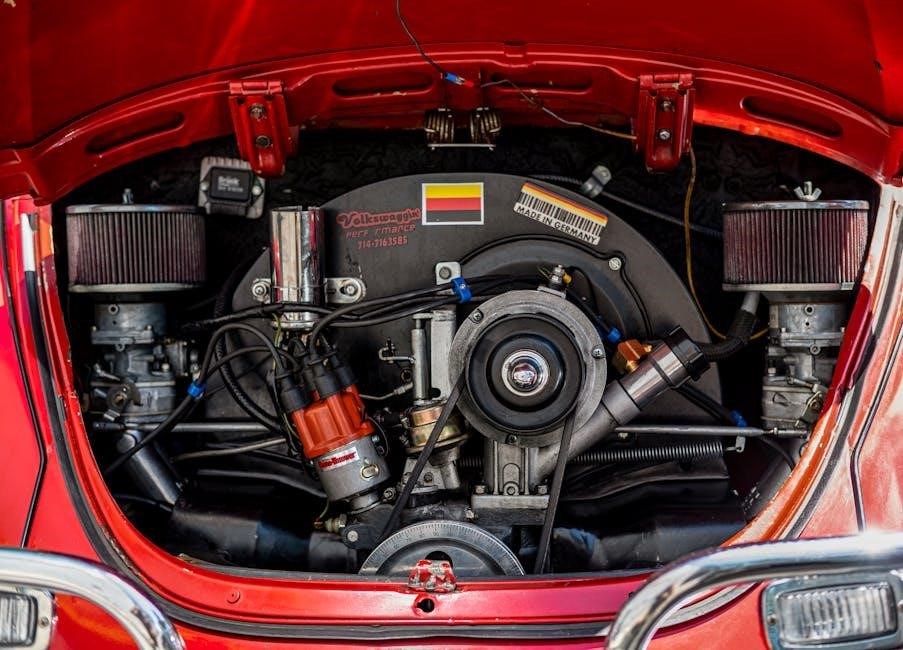Volkswagen Maintenance Schedule PDF: A Comprehensive Guide
Volkswagen vehicles‚ renowned for their reliability‚ require regular
maintenance․ This guide provides a comprehensive overview of the
Volkswagen maintenance schedule․ You can use our online tool by entering your VIN or your model‚ year‚ and trim level․
Understanding the Importance of Regular VW Maintenance
Regular Volkswagen maintenance is crucial for ensuring your vehicle’s longevity‚ performance‚ and safety․ Following the recommended maintenance schedule helps prevent costly repairs and keeps your VW operating smoothly‚ year after year․ Routine care‚ including oil changes‚ filter replacements‚ and brake inspections‚ addresses potential issues before they escalate․
Consistent maintenance optimizes fuel efficiency‚ extends the life of vital components‚ and maintains your vehicle’s value․ Adhering to the VW maintenance schedule ensures that your vehicle receives the necessary attention at the right intervals‚ maximizing its reliability and minimizing unexpected breakdowns․ Furthermore‚ regular servicing by certified VW technicians guarantees that your vehicle is maintained with genuine VW parts and expertise‚ preserving its original performance characteristics․
By prioritizing regular maintenance‚ you invest in the long-term health and dependability of your Volkswagen‚ safeguarding your investment and ensuring a safe and enjoyable driving experience․ Keeping tabs on general‚ minor‚ and standard maintenance is one of the best ways to extend the life of your Volkswagen․
Accessing Your Specific VW Maintenance Schedule
To access your specific Volkswagen maintenance schedule‚ several resources are available․ The most accurate source is your vehicle’s owner’s manual‚ which provides detailed information on recommended service intervals and procedures․ Additionally‚ Volkswagen‘s official website offers a convenient online tool where you can enter your Vehicle Identification Number (VIN) or your model year‚ model‚ and trim level to retrieve your vehicle’s maintenance schedule and warranties․
This tool provides a personalized schedule tailored to your specific VW model and its unique maintenance needs․ Alternatively‚ you can consult with a certified Volkswagen dealer or service center‚ where trained technicians can provide you with a comprehensive maintenance plan based on your vehicle’s specifications and driving conditions․ They can also access your vehicle’s service history to ensure that all necessary maintenance tasks are performed at the appropriate intervals․
By utilizing these resources‚ you can obtain a clear understanding of your VW‘s maintenance requirements and ensure that it receives the proper care to maintain its performance and reliability․ The intervals shown in this table are based on vehicles operating under normal conditions․
Using the VIN to Find Your Maintenance Schedule
Your Vehicle Identification Number (VIN) is a unique 17-character code that identifies your specific Volkswagen vehicle․ This number can be used to access your vehicle’s precise maintenance schedule․
To find your maintenance schedule using the VIN‚ locate the VIN on your vehicle․ It’s typically found on the driver’s side dashboard near the windshield‚ on the driver’s side doorjamb‚ or on your vehicle’s registration or insurance documents․ Once you have the VIN‚ visit the official Volkswagen website and navigate to the “Owners” or “Service” section․ Look for a VIN lookup tool or a maintenance schedule finder․ Enter your VIN into the tool‚ and it will generate a customized maintenance schedule specific to your vehicle․
The schedule will outline the recommended service intervals and the specific maintenance tasks that should be performed at each interval․ This ensures that your VW receives the proper care at the right times‚ helping to maintain its performance‚ reliability‚ and longevity․
Alternatively‚ you can provide your VIN to a certified Volkswagen dealer or service center‚ and they can access your vehicle’s maintenance information for you․
Online Tools for Determining Your VW’s Schedule
Several online tools are available to help you determine your Volkswagen’s specific maintenance schedule․ These tools offer a convenient way to access the information you need to keep your VW in top condition․
The official Volkswagen website provides a maintenance schedule tool where you can enter your vehicle’s VIN‚ model year‚ model‚ and trim level to generate a customized schedule․ This tool provides detailed information about the recommended service intervals and tasks․
Many Volkswagen dealerships also offer online tools on their websites․ These tools often allow you to input your vehicle’s information and receive a personalized maintenance schedule․ Some third-party websites and apps provide maintenance schedule information for various makes and models‚ including Volkswagen․ However‚ it’s essential to verify the accuracy and reliability of these sources before relying on them․
When using online tools‚ ensure you have accurate information about your vehicle‚ such as the model year‚ engine type‚ and trim level․ This will help ensure that the generated maintenance schedule is tailored to your specific VW․
These online tools can simplify the process of understanding your VW’s maintenance requirements and help you stay on top of essential services․

Key Maintenance Intervals and Services
Regular maintenance is crucial for keeping your Volkswagen running smoothly․ Key intervals include services at specific mileage or time intervals․ These services ensure optimal performance and prevent costly repairs․
10‚000 Mile/1 Year Minor Maintenance
At the 10‚000-mile mark or one year‚ whichever occurs first‚ your Volkswagen requires minor maintenance․ This interval is crucial for maintaining your vehicle’s performance and preventing potential issues․
This minor maintenance typically includes several key tasks․ The most important of these is an oil and filter change․ Fresh oil keeps your engine lubricated‚ reduces friction‚ and prevents overheating; Additionally‚ a brake inspection is performed to ensure your braking system is functioning correctly‚ which is very important for your safety on the road․
Furthermore‚ tire rotation and inspection are carried out to promote even wear and extend the life of your tires․
These services are essential for ensuring your Volkswagen continues to operate smoothly and reliably․ Following the recommended maintenance schedule helps prevent costly repairs and maintains your vehicle’s value․ Also‚ minor services include checking the fluid levels․
Consult your vehicle’s maintenance schedule for specific details and recommendations․ Regular minor maintenance is a proactive approach to keeping your Volkswagen in top condition․
Oil and Filter Change
One of the most critical aspects of Volkswagen maintenance is the regular oil and filter change․ Typically required every 10‚000 miles or once a year‚ depending on your driving habits‚ this service is essential for maintaining engine health․ Fresh oil keeps your engine lubricated‚ reduces friction‚ and prevents overheating․
The oil filter is another critical component․ It removes contaminants and debris from the oil‚ preventing them from circulating through the engine and causing damage․ A clean oil filter ensures that the oil remains effective in protecting the engine’s internal parts․
Using the correct type of oil is also crucial․ Volkswagen vehicles often require specific synthetic oils to meet their unique engine needs․ Consulting your owner’s manual or a trusted Volkswagen service center will help you determine the right oil for your vehicle․
Regular oil and filter changes contribute significantly to your Volkswagen’s longevity and performance․ Neglecting this service can lead to engine damage‚ reduced fuel efficiency‚ and costly repairs․
Ensure this crucial maintenance is part of your regular VW service schedule․
Brake Inspection
A thorough brake inspection is an integral part of your Volkswagen’s maintenance schedule․ Regular brake inspections ensure your vehicle’s braking system is functioning correctly‚ maintaining your safety on the road․ During a brake inspection‚ several components are checked for wear and damage․
Brake pads are examined for thickness‚ as worn brake pads can significantly reduce braking performance․ Brake rotors are inspected for cracks‚ warping‚ and excessive wear․ The brake lines and hoses are checked for leaks and damage‚ ensuring proper hydraulic pressure․
Brake fluid levels are also assessed‚ and the fluid’s condition is evaluated․ Contaminated or old brake fluid can compromise braking efficiency․ Calipers are inspected for proper function and any signs of corrosion․ Addressing brake issues promptly can prevent more extensive and costly repairs․
If any problems are detected during the inspection‚ such as worn brake pads or damaged rotors‚ immediate replacement or repair is recommended․ Regular brake inspections‚ as part of your VW service‚ help maintain optimal braking performance and ensure your safety․ Ensure your VW gets regular inspections․
Tire Rotation and Inspection
Tire rotation and inspection are essential components of your Volkswagen’s maintenance schedule․ Regular tire rotation helps ensure even wear across all tires‚ extending their lifespan and maintaining optimal handling and safety․ During tire rotation‚ the tires are moved from one position to another on the vehicle‚ following a specific pattern recommended by Volkswagen․
This process helps distribute wear evenly‚ as tires in different positions experience varying levels of stress and friction․ Tire inspection involves checking the tire pressure‚ tread depth‚ and overall condition of each tire․ Proper tire pressure is crucial for fuel efficiency‚ handling‚ and tire longevity․
Tread depth is measured to ensure the tires have sufficient grip on the road‚ especially in wet or slippery conditions․ The tires are also inspected for any signs of damage‚ such as cuts‚ bulges‚ or uneven wear patterns․ Addressing tire issues promptly can prevent blowouts and maintain safe driving conditions․
If any problems are detected during the inspection‚ such as low tread depth or tire damage‚ immediate replacement or repair is recommended․ Regular tire rotation and inspection‚ as part of your VW service‚ help maximize tire life‚ improve handling‚ and ensure your safety on the road․ Regular maintenance is crucial․

Additional Maintenance Considerations
Beyond the standard maintenance intervals‚ several additional factors can impact your Volkswagen’s upkeep․ Severe driving conditions‚ prepaid plans‚ and the choice between genuine and aftermarket parts all play a role in your vehicle’s longevity and performance․
Severe Driving Conditions and Their Impact
Driving conditions significantly influence your Volkswagen’s maintenance needs․ “Severe” conditions‚ such as frequent short trips‚ stop-and-go traffic‚ extreme temperatures‚ and dusty or salty environments‚ place added stress on vehicle components․ These conditions accelerate wear and tear‚ necessitating more frequent servicing than the standard schedule indicates․
For instance‚ frequent short trips prevent the engine from reaching optimal operating temperature‚ leading to incomplete combustion and increased oil contamination․ Stop-and-go traffic puts excessive strain on the brakes and transmission․ Extreme heat can degrade fluids and rubber components‚ while cold weather can thicken fluids and make starting more difficult․
Dusty or salty environments can contaminate air filters and accelerate corrosion․ If you regularly operate your Volkswagen under severe driving conditions‚ consider shortening the oil change intervals‚ brake inspections‚ and other maintenance tasks․ Consult your owner’s manual or a trusted VW technician to determine the appropriate adjustments to your maintenance schedule․ Prioritizing maintenance under these conditions will help prolong the life of your car․
Prepaid Maintenance Plans: Are They Worth It?
Volkswagen offers prepaid maintenance plans designed to streamline vehicle care and potentially save money․ These plans typically cover the manufacturer-recommended maintenance intervals for a set period or mileage‚ bundling services like oil changes‚ filter replacements‚ and inspections into a single‚ upfront payment․
The value of a prepaid plan depends on individual driving habits and vehicle needs․ For drivers who adhere strictly to the recommended maintenance schedule‚ a prepaid plan can offer several advantages․ It provides fixed costs‚ protecting against inflation and potential price increases for services․ It also ensures that trained VW technicians using Genuine VW Parts perform the work‚ maintaining vehicle quality and warranty compliance․
However‚ it’s crucial to carefully evaluate the plan’s terms and conditions․ Consider the included services‚ duration‚ and mileage limits․ Compare the plan’s cost to the potential cost of paying for each service individually․ If you anticipate needing additional services beyond the plan’s coverage or if your driving habits don’t align with the recommended schedule‚ a prepaid plan may not be the most cost-effective option․ Weighing these factors will help you determine if a Volkswagen prepaid plan is right for you․
Genuine VW Parts vs․ Aftermarket Parts
When maintaining your Volkswagen‚ a key consideration is the choice between Genuine VW Parts and aftermarket alternatives․ Genuine VW Parts are manufactured by Volkswagen or its authorized suppliers and are designed specifically for your vehicle model․ Aftermarket parts‚ on the other hand‚ are produced by independent manufacturers and are often marketed as direct replacements for original parts․
Genuine VW Parts offer several advantages․ They ensure proper fit‚ function‚ and performance‚ maintaining the vehicle’s original design and engineering standards․ They also come with a Volkswagen warranty‚ providing added protection and peace of mind․ Using Genuine VW Parts can help preserve your vehicle’s value and ensure optimal performance․
Aftermarket parts may be more affordable upfront‚ but their quality and reliability can vary significantly․ Some aftermarket parts may not meet the same standards as Genuine VW Parts‚ potentially leading to compatibility issues‚ reduced performance‚ or premature failure․ While some aftermarket brands offer high-quality alternatives‚ it’s essential to research and choose reputable suppliers․
Ultimately‚ the decision depends on your budget and priorities․ If you prioritize quality‚ reliability‚ and warranty protection‚ Genuine VW Parts are the preferred choice․ If cost is a primary concern‚ carefully consider the potential risks and benefits of aftermarket parts before making a decision․

Finding a Reliable VW Service Center
Locating a trustworthy Volkswagen service center is crucial for maintaining your vehicle’s performance and longevity․ A reliable service center can provide expert care‚ accurate diagnostics‚ and genuine VW parts‚ ensuring your car receives the attention it deserves․
Start by considering authorized Volkswagen dealerships․ These dealerships have factory-trained technicians who specialize in VW vehicles․ They possess the knowledge and expertise to perform routine maintenance‚ diagnose complex issues‚ and carry out necessary repairs․ Authorized dealerships also use genuine VW parts‚ ensuring compatibility and reliability․
Alternatively‚ explore independent service centers that specialize in European vehicles‚ particularly Volkswagen․ Look for centers with certified technicians who have experience working on VW models․ Check online reviews and ask for recommendations from other VW owners to gauge the center’s reputation and customer satisfaction․
When evaluating a service center‚ inquire about their diagnostic capabilities‚ repair procedures‚ and warranty policies․ A reputable center should provide transparent explanations of the work needed and offer a warranty on parts and labor․ Additionally‚ consider factors such as location‚ convenience‚ and customer service when making your decision․
By carefully researching and selecting a reliable VW service center‚ you can ensure your vehicle receives the best possible care‚ helping you maintain its performance and extend its lifespan․
